20 Best AI Tools for HR Professionals in 2025
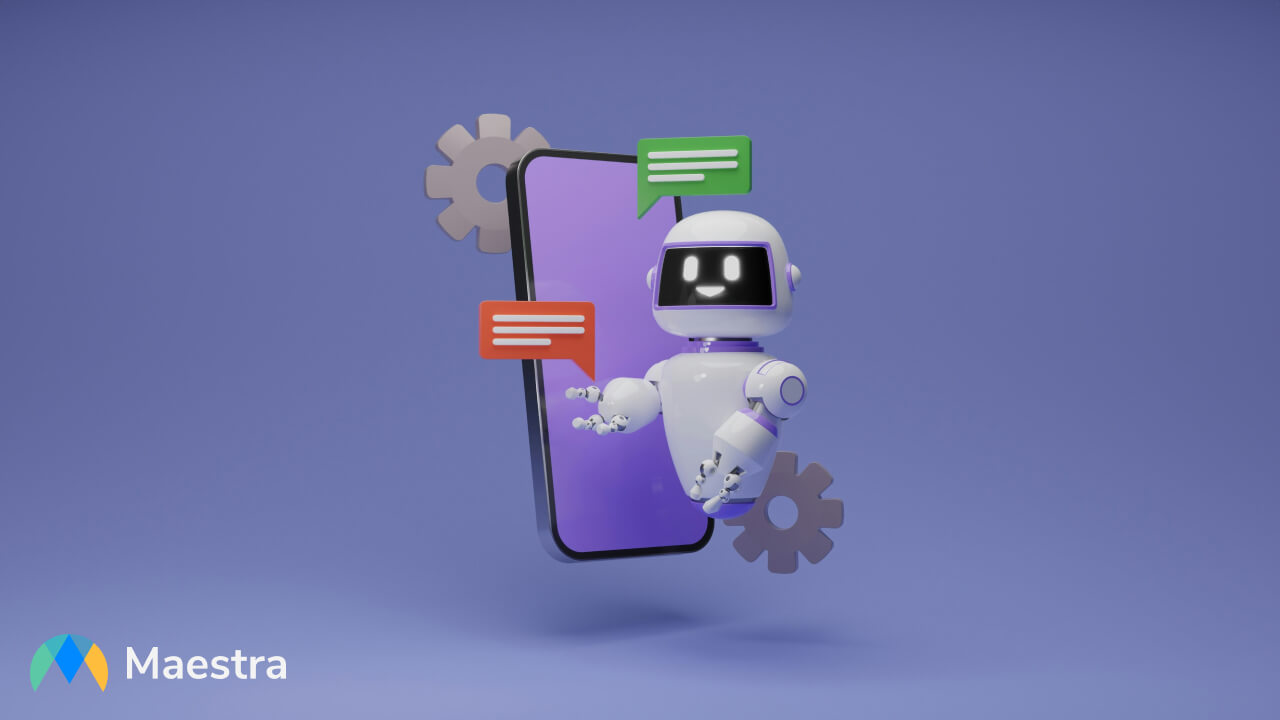
Human resources may be all about people, but AI is quickly making its mark in this field, just as it has in other areas of our lives. Today, numerous AI tools are transforming HR by automating tasks like recruitment, onboarding, and performance management. As a result, it’s essential for HR professionals to understand how AI is reshaping their industry.
In this blog, we’ll explore a selection of 20 powerful AI tools tailored for various HR functions. We’ll also share actionable tips for adopting these tools thoughtfully.
Let's get started.
Top AI Tools for HR for Recruitment, Engagement & More
Choosing the right AI tools for HR can feel overwhelming, with so many platforms promising to save time, enable data-driven hiring decisions, and improve employee experience. To help, we’ve compared the top options in one place.
The table below highlights each tool’s standout feature and pricing, making it easy to see which solutions best fit your HR team’s needs and budget.
| AI HR Tool | Standout Feature | Pricing |
| ChatGPT | Customized job descriptions and bias-free language suggestions | Free plan available; paid plans from $20/month |
| Fetcher | AI-powered talent sourcing with automated candidate relationship management | Custom pricing |
| Eightfold | Predictive analytics for talent management and employee retention | Custom pricing |
| Breezy | Automated recruitment workflows and candidate pipeline management | Free plan available; paid plans start at $189/month |
| Hirevue | Video interviewing with AI-driven assessments and gamified candidate evaluation | Available in Essential, Enterprise, and Premium packages; custom pricing based on hiring needs |
| Harver | Neuroscience based talent assessments to reduce bias | Custom pricing |
| X0PA AI | Predictive analytics for candidate success and retention | Custom pricing |
| Deel | Automated onboarding with AI-powered workflows | Custom pricing |
| Reclaim | Smart scheduling to prevent burnout | Free plan available; paid plans start at $8/month |
| Happily.ai | Daily engagement nudges and surveys for employee wellbeing | Growth plan is $9/month; Scale plan with custom pricing |
| Engagedly | AI-powered coach “Marissa” for performance management and talent development | Plans typically start at $5–$9/month; advanced modules custom priced |
| Peakon by Workday | Real-time employee feedback with AI-driven insights | Custom pricing |
| NotebookLM | AI-powered research for summarizing and synthesizing HR documents | Free to use with a personal Google account (usage limits apply); expanded access available via Google One AI Premium and Google Workspace Enterprise |
| Synthesia | AI text-to-video generator with avatars and templates for content creation | Starter plan is $29/month; custom enterprise pricing |
| Maestra | Real-time translation and transcription in 125+ languages | Free trial available; paid plans start at $39/month; custom enterprise pricing |
| Jasper | AI templates for HR blogs, newsletters, and social posts | Pro plan is $59/month; custom enterprise pricing |
| Gamma | AI-powered presentations with templates and brand integration | Free plan available; paid plans start at $8/month per user; custom enterprise pricing |
| Cegid Talentsoft | Integrated talent management and personalized learning modules | Custom pricing |
| Personio | Comprehensive HR suite with payroll, time tracking, and performance management | Custom pricing |
| Leena | AI-powered HR chatbot for instant query resolution and onboarding support | Custom pricing |
1. ChatGPT
For: writing job descriptions
Yes, ChatGPT is a valuable tool for HR professionals as it can generate precise job descriptions that can attract the right candidates. With careful prompt engineering, you can craft specific descriptions that emphasize the needs of your organization. This helps HR teams to attract top talent by presenting a clear and compelling image of the opportunity.
Why it’s powerful:
- Customized content creation: You can use ChatGPT to tailor job descriptions according to the company’s culture, values, and specific job requirements.
- Bias-free language: ChatGPT can highlight potentially biased or exclusionary language in a job description, leading to a more equitable hiring process.
- Search engine optimization: The tool can suggest keywords and phrases that align with search engine algorithms, improving the visibility of a job posting to the right candidates.
Pricing: Free plan available; paid plans start from $20/month.
2. Fetcher
For: talent acquisition
A robust AI recruiting software, Fetcher can help HR leaders find the best talent and build exceptional teams. Its AI algorithms can analyze candidates deeply across multiple sources so you don’t miss out on hidden gems. This will put you ahead of companies who only use LinkedIn, expanding your reach beyond a single platform.
Why it's powerful:
- AI-powered talent sourcing: The tool’s advanced AI technology can show high-quality candidate profiles that match your hiring needs.
- Candidate engagement: You can send automated yet personalized emails, and Fetcher will track responses to identify the most interested prospects.
- Personalized diversity search criteria: You can add specific diversity goals to your searches and build a well-represented pipeline.
Pricing: Custom pricing based on company size and hiring volume.
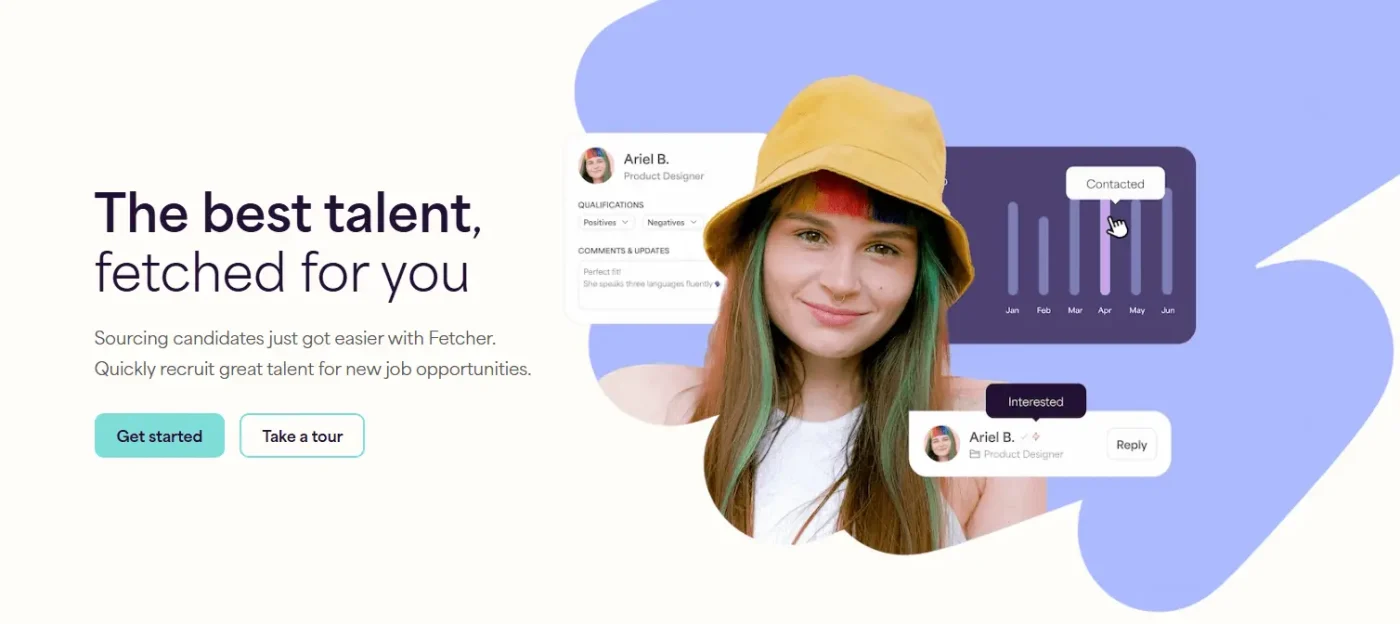
3. Eightfold
For: talent acquisition and career development
Eightfold uses deep learning to analyze millions of career paths, enabling HR professionals to match the right candidates with the right positions. The tool also supports career development, allowing employees to see growth opportunities within the organization. By mapping skills to future roles, Eightfold helps organizations improve retention and employee satisfaction.
Why it’s powerful:
- Talent matching: Eightfold analyzes resumes and job descriptions to find the best candidates.
- Diversity and inclusion: HR teams can gain insights to support diverse hiring practices.
- Employee retention: The tool suggests career paths and employee development opportunities to retain talent.
Pricing: Enterprise solution with custom pricing.
4. Breezy
For: recruitment and candidate tracking
Breezy is an all-in-one recruitment tool that simplifies the recruitment process with pipeline management and candidate sourcing. Automated workflows handle routine HR tasks such as background checks, interview scheduling, and follow-ups. This frees recruiters to focus on building stronger connections with top talent.
Why it’s powerful:
- Automated workflows: Breezy streamlines repetitive tasks like candidate follow-ups.
- Customizable pipelines: HR professionals can create specific hiring stages for different roles.
- Video assessments: The tool adds video questions and asynchronous video interviews to engage candidates.
Pricing: Free plan available; paid plans start at $189/mo.
5. Hirevue
For: video interviewing and assessments
Hirevue combines video interviewing with AI-driven assessments to evaluate candidates' skills and fit. Its assessments can measure competencies through video interviews, written responses, or game-based activities. The tool scales easily, making it suitable for both high-volume recruiting and specialized role hiring.
Why it’s powerful:
- Automated interviews: Hirevue Saves time with structured video interviews for initial screening.
- Bias reduction: The AI-powered tool uses algorithms designed to reduce bias in assessments.
- Gamified assessments: HR teams can leverage interactive games to evaluate candidates’ skills in a fun, engaging way.
Pricing: Available in Essential, Enterprise, and Premium packages, with custom quotes based on hiring needs.
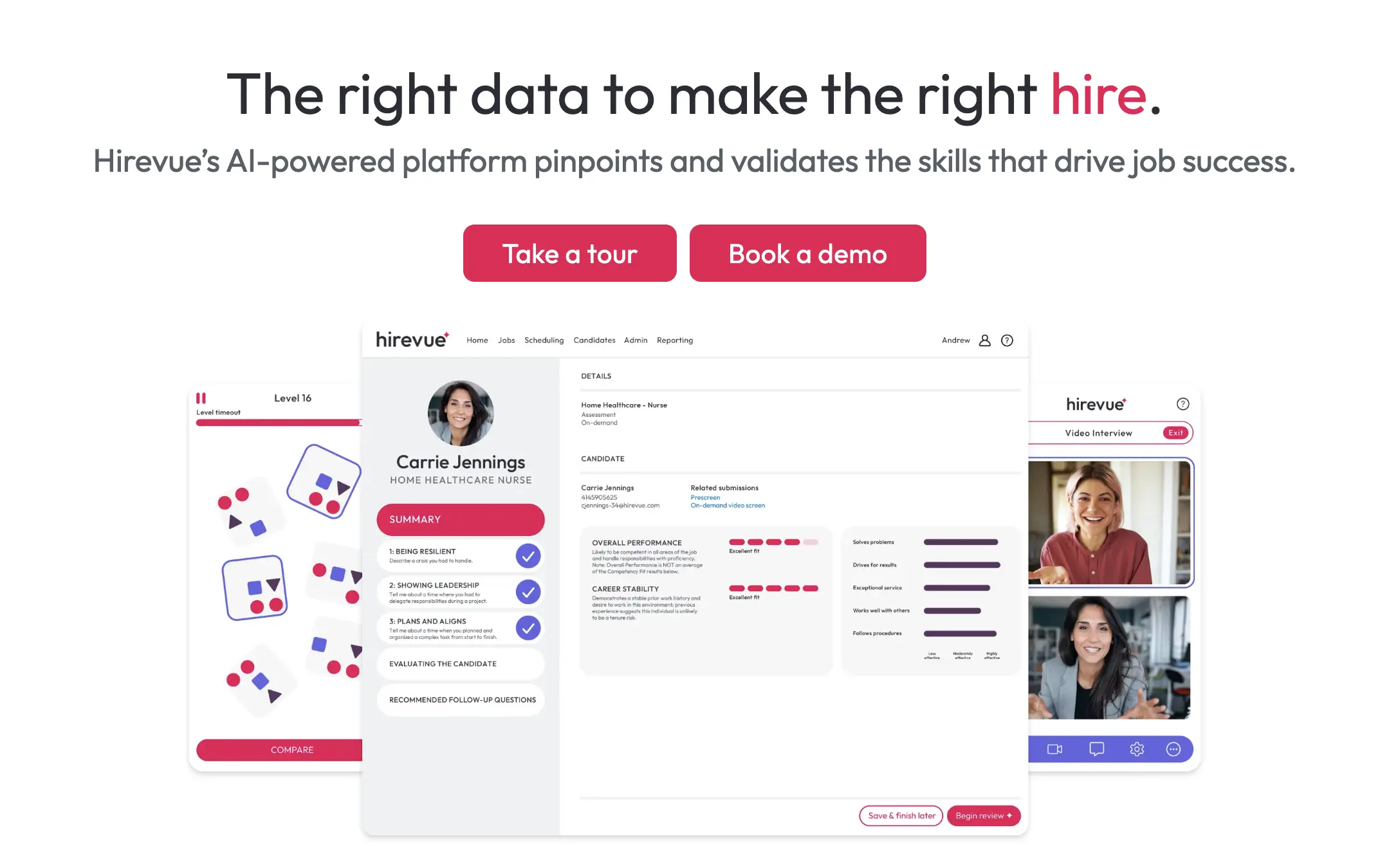
6. Harver
For: talent assessments and bias reduction
Harver leverages neuroscience‑based gamified assessments (via Pymetrics) to evaluate soft skills like attention, learning agility, and risk tolerance, alongside structured cognitive ability tests such as verbal, spatial, and numerical reasoning. This scientifically‑grounded approach helps HR teams match candidates to roles based on true potential while minimizing unconscious bias.
Why it’s powerful:
- Fair assessments: Harver uses bias-free algorithms to make assessments equitable.
- Skill matching: The tool matches candidates based on soft skills rather than just experience.
- Data-driven hiring: Hiring managers can utilize data insights for more informed hiring decisions.
Pricing: Custom pricing, tailored to organization size and assessment volume.
7. X0PA AI
For: hiring and talent optimization
As one of the best HR AI tools, X0PA offers a comprehensive suite of tools for hiring, including resume parsing, skill-matching, and predictive analytics for candidate success and retention. Its dashboards provide real-time analytics on talent pipelines, hiring efficiency, and long-term employee outcomes. These insights empower HR teams to make smarter, data-driven decisions.
Why it’s powerful:
- Predictive analytics: X0PA forecasts candidates’ job success and tenure.
- Skill and personality matching: The tool aligns candidates with roles based on unique personality and skill fits.
- End-to-end automation: HR professionals save time with automated workflows from sourcing to onboarding.
Pricing: Custom pricing for SMBs and enterprises; quotes available on request.
8. Deel
For: employee onboarding
Deel sets up and automates the entire onboarding process step by step. You can start with one of the tool’s templates or let AI create your first draft. Feel free to live-embed content from other platforms like Slack so you don’t have to maintain multiple documents.
Why it’s powerful:
- Smart workflows: You can automatically assign HRIS data like starting date, role, etc. and a corresponding onboarding workflow.
- Progress tracker: You can see the tasks people have completed to understand where they are in their onboarding journey.
- Casual reminders: The tools send automated reminders (e.g., upcoming milestones) so you connect with new employees continuously.
Pricing: Deel Talent, which includes its AI-powered HR services, is offered on a custom pricing basis.
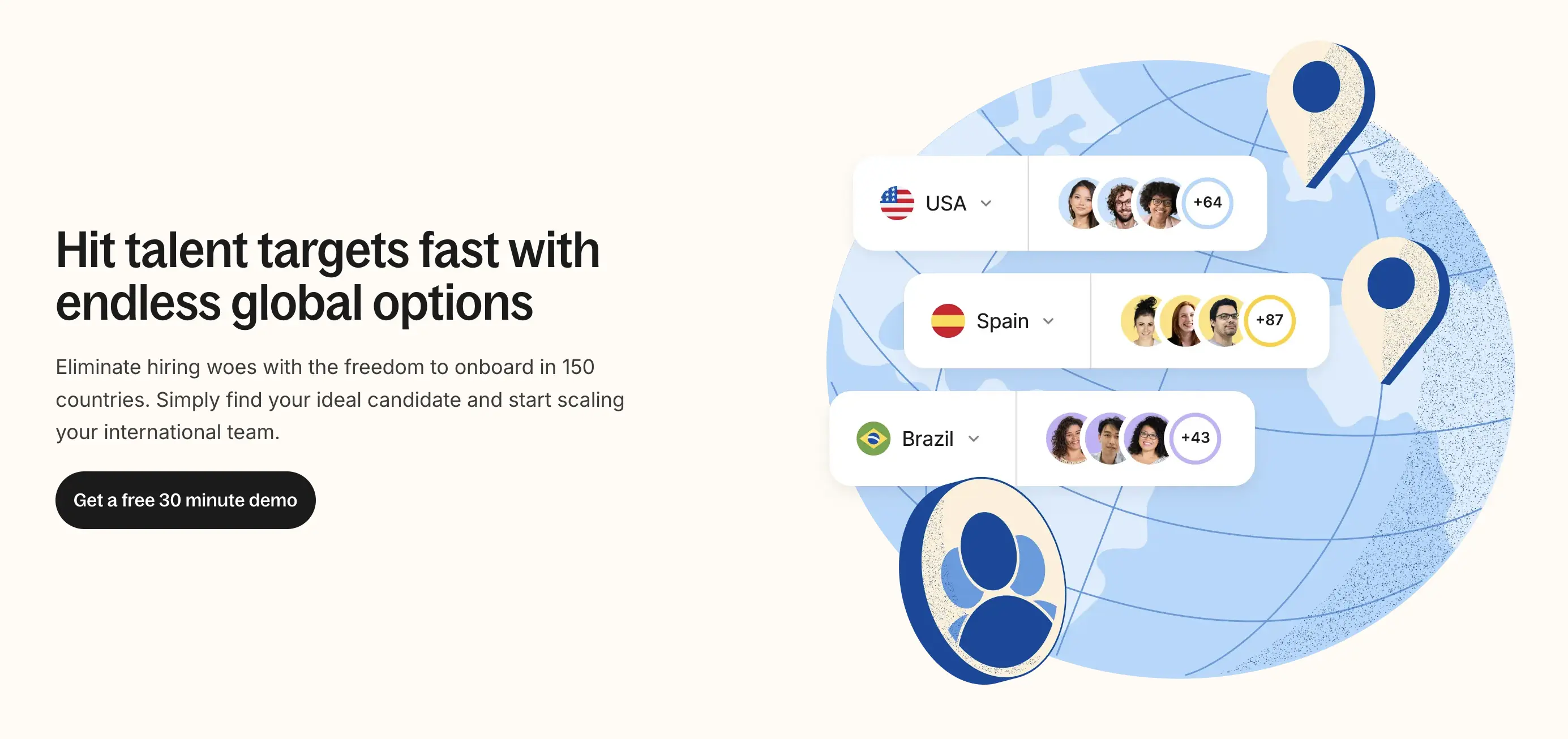
9. Reclaim
For: smart scheduling
Not many AI tools for HR prioritize employee burnout yet here we have Reclaim. Integrating with Google Calendar, the tool can intelligently analyze and organize individual schedules to promote a healthy-work life balance in the organization. This enables HR managers to reduce the risk of burnout.
Why it’s powerful:
- No-Meeting Days: You can create No-Meeting Days for employees so they can focus on deep work without interruption.
- Smart Scheduling Links: No more availability issues as smart Scheduling Links can understand your priorities and organize your calendar accordingly.
- Automated breaks: You can enable employees to automatically schedule breaks to combat meeting fatigue.
Pricing: Free plan available; paid plans start at $8/month per user.
10. Happily.ai
For: employee engagement
Happily.ai can be a valuable tool for HR managers who seek to improve employee engagement and wellbeing. The platform promotes both individual and organizational development by putting people at the center and making them feel valued. It builds positive habits and better work relationships via daily surveys, gamification, recognition, and rewards.
Why it’s powerful:
- Daily check-ins: These nudges sent to employees can initiate self-reflection while uncovering performance blockers and opportunities.
- Automated surveys: You can share automated surveys and engagement activities to make better decisions based on people analytics.
- Meaningful conversations: HR management can provide developmental guidance and get AI-driven insights according to an employee’s reply.
Pricing: Growth plan is $9 per user per month for teams up to 200 users. See more on pricing.
11. Engadedly
For: performance management
HR leaders and professionals partner with Marissa, Engagedly’s AI-powered coach, to manage talent and drive desired results. The tool can automate tasks related to performance reviews and track goal achievement. It can also suggest personalized learning paths based on identified needs.
Why it’s powerful:
- Daily check-ins: These nudges sent to employees can initiate self-reflection while uncovering performance blockers and opportunities.
- Automated surveys: You can share automated surveys and engagement activities to make better decisions based on people analytics.
- Meaningful conversations: HR management can provide developmental guidance and get AI-driven insights according to an employee’s reply.
Pricing: Starts at around $5–$9 per user per month; advanced modules priced separately.
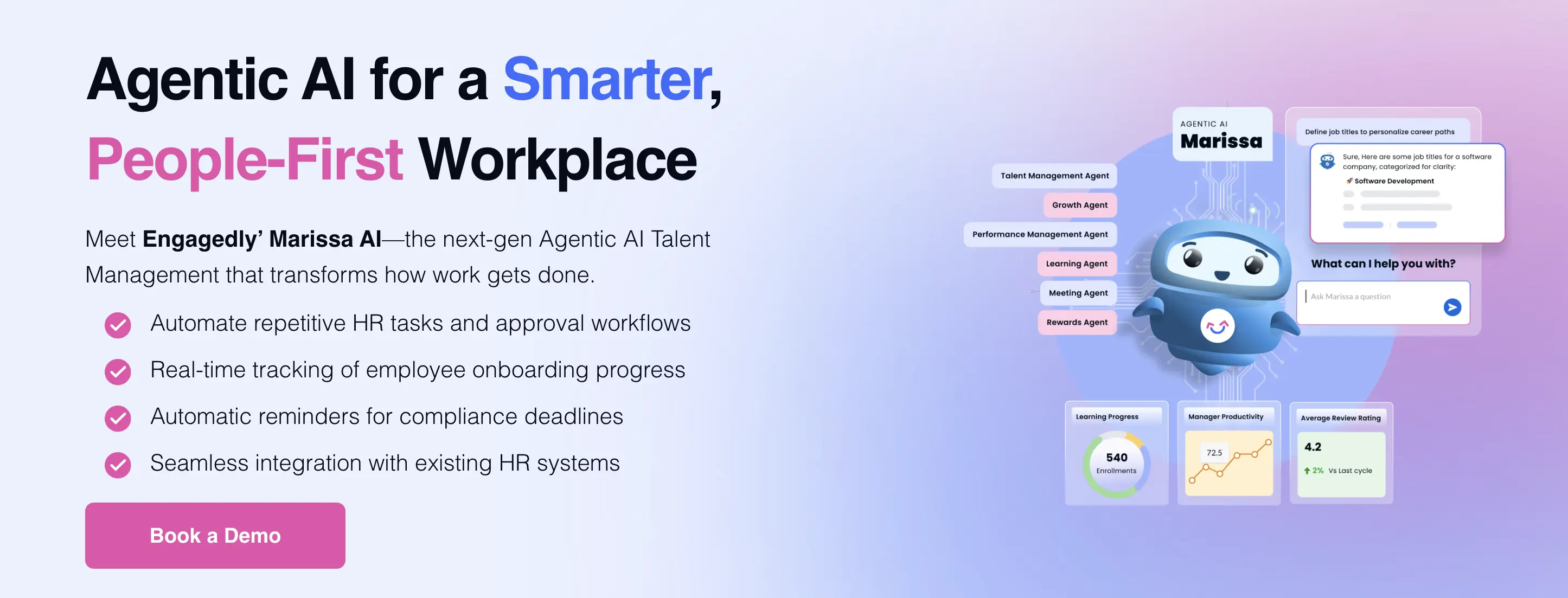
12. Peakon by Workday
For: employee feedback
Peakon helps HR teams understand employee sentiment and engagement through AI-driven insights gathered from anonymous employee feedback. The platform delivers real-time dashboards that highlight trends across teams and departments. This allows managers to act quickly on issues before they escalate.
Why it's powerful:
- Real-time insights: Peakon collects and analyzes feedback to gauge employee sentiment.
- AI-powered predictions: The tool predicts potential turnover or engagement risks.
- Employee suggestions: HR professionals can analyze feedback to highlight common employee suggestions.
Pricing: Custom pricing; available as part of Workday HCM suite.
13. NotebookLM
For: knowledge management and research
NotebookLM, developed by Google, is an AI-powered research assistant that can help AI teams organize and synthesize information. By uploading documents, HR professionals can generate summaries, highlight key insights, and even ask questions about the content to quickly get answers. This makes it especially useful for preparing HR reports, analyzing employee feedback, or creating onboarding materials.
Why it's powerful:
- Audio overviews: NotebookLM transforms uploaded content into podcast-style audio summaries so HR teams can digest long reports more efficiently.
- Source citation: Every response is grounded in the uploaded documents, ensuring accuracy and trustworthiness.
- Latest Gemini models: The tool is continuously updated with the most powerful Gemini models, which enables more sophisticated reasoning, analysis, and synthesis of complex information across multiple documents.
Pricing: Free to use with a personal Google account (subject to usage limits), with expanded access available through paid plans such as Google One AI Premium and Google Workspace Enterprise.
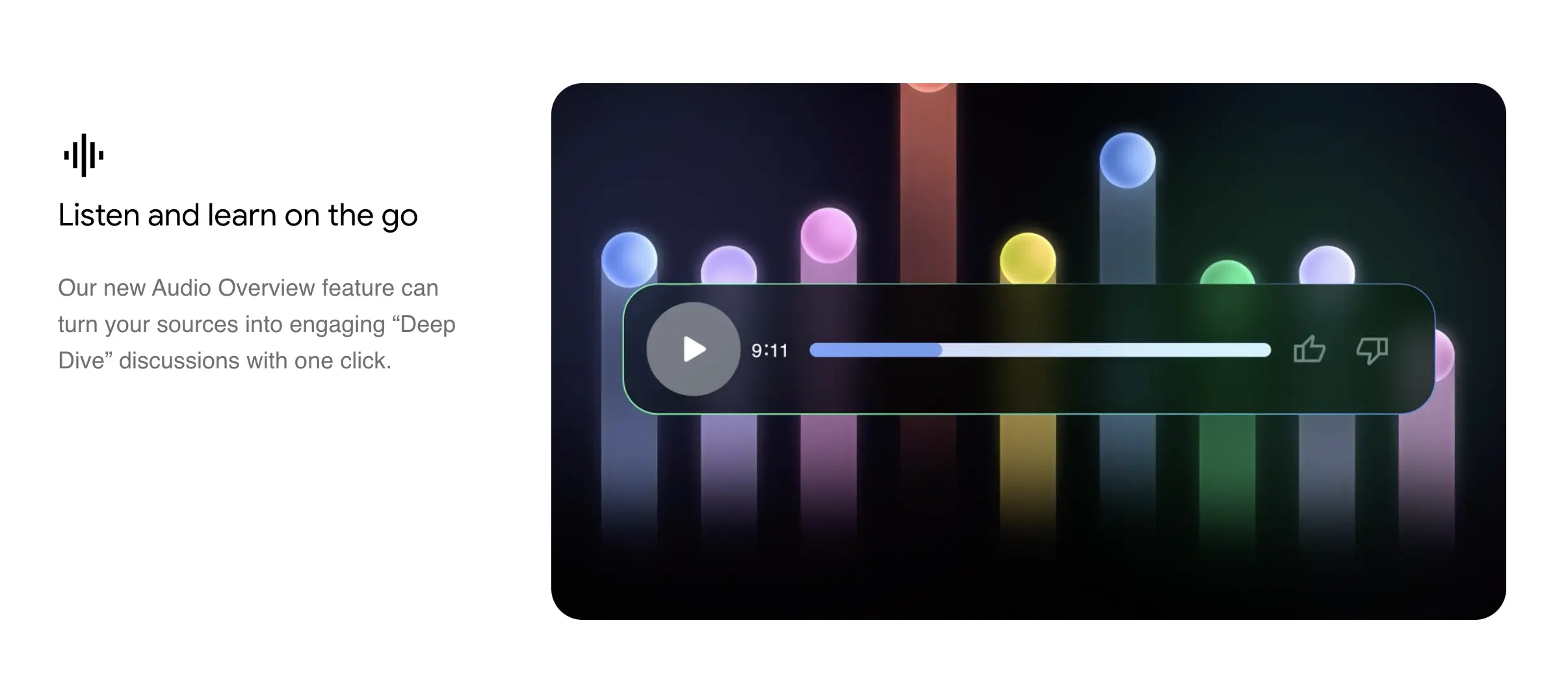
14. Synthesia
For: making training videos
As an AI text-to-video generator, Synthesia can create professional training videos with AI avatars and realistic voiceovers. You can use your own script or generate one with Chat-GPT like prompts. Then you can customize your training video by playing with colors, fonts, background music, and more.
Why it’s powerful:
- AI Avatars: Synthesia has a library of 140 AI Avatars varied in age, ethnicity, and gender.
- Easy updates: You can edit your script and have the changes automatically reflected in the video.
- 200+ templates: The tool offers 200+ free training video templates catering to different needs.
Pricing: Free plan available. Starter plan is $29/month. Custom enterprise pricing.
15. Maestra
For: real-time and on-demand transcription and translation
Maestra makes HR meetings, training sessions, and company-wide communications more accessible by offering live speech translation and transcription in 125+ languages. Designed for global teams, it allows participants in onboarding sessions, leadership town halls, or trainings to choose their preferred target language and follow along with both voice and captions. Beyond live events, Maestra also generates on-demand transcripts, subtitles, and voiceovers for recordings, ensuring that no employee misses out on important information.
Why it's powerful:
- Multilingual meeting sessions: Participants can join via a link or QR code and instantly choose their preferred language for live audio and captions.
- AI voice cloning: Maestra provides AI voice cloning for both real-time and on-demand translation, preserving the speaker’s tone and style so the message feels authentic across languages.
- Post-meeting insights: The tool can automatically generate AI-powered summaries, extract keywords, and even transform recordings into quizzes for training and knowledge checks.
Pricing: Free trial available; paid plans for real-time tools start at $39/month, with custom enterprise solutions.
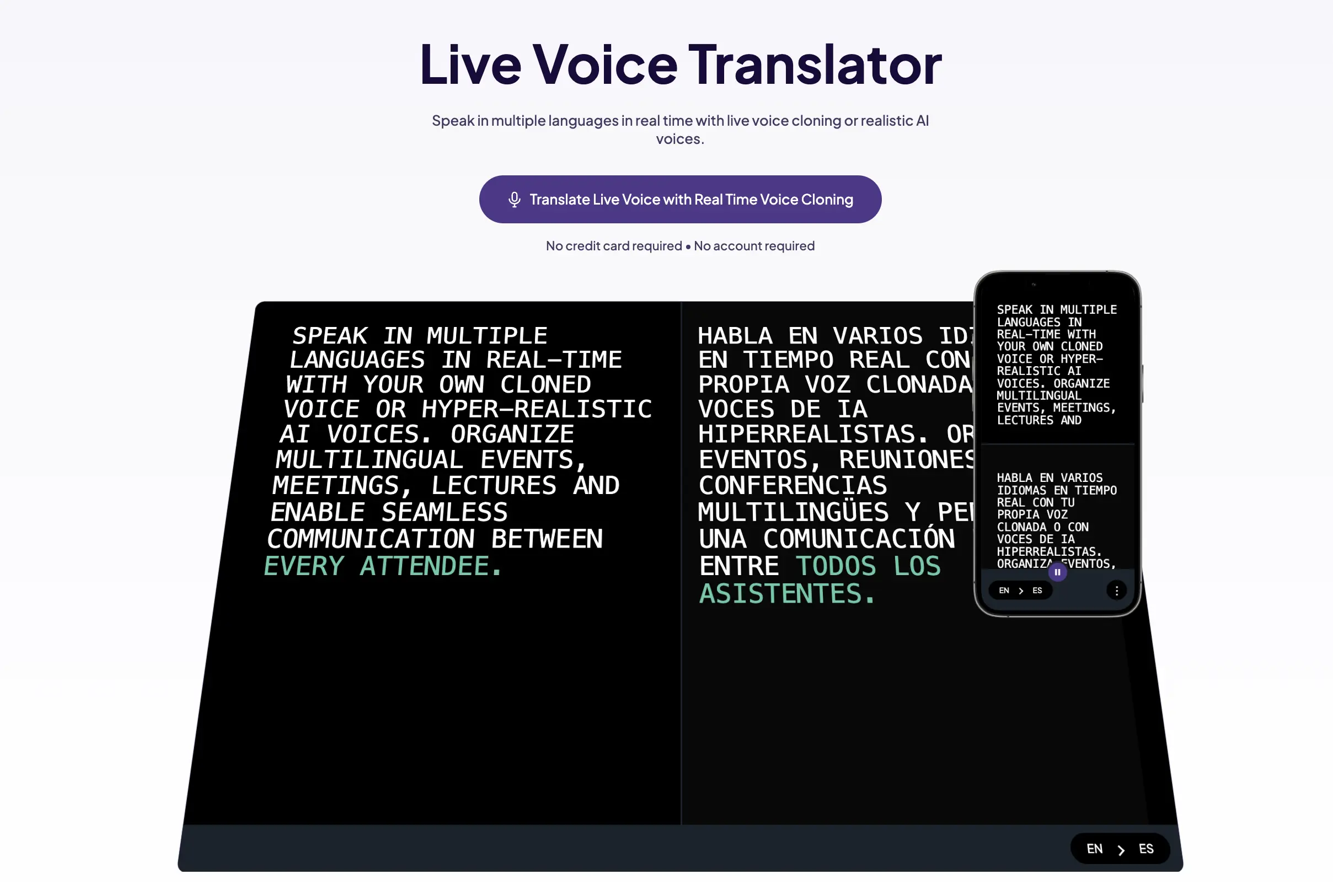
16. Jasper
For: content creation
With 50+ templates, it’s no wonder why Jasper is one of the most powerful AI tools for HR professionals who want to create content. Let’s say you need to write a blog post on employee satisfaction or design posts for your HR department’s social media account. Jasper can make your job much easier by generating prompt-based content tailored to your organization’s style.
Why it’s powerful:
- Social post generators: The tool offers a LinkedIn Headline Generator and an Instagram Caption Generator to craft attention-grabbing copy.
- Blog and newsletter writing: You can brainstorm new topics for your company’s HR blog or newsletter, and use AI to transform those ideas into a well-written text.
- Visual aid: Don’t forget to support your message with the tool’s AI image generator.
Pricing: Free trial available; Pro plan is $59/month. Custom business pricing available on request.
17. Gamma
For: creating AI-powered presentations
Gamma is an AI tool that enables HR teams to build visually engaging presentations quickly. Instead of manually designing slides, HR professionals can enter a prompt and Gamma generates polished decks for training, performance reviews, or company updates. It’s ideal for teams looking to save time while maintaining a professional design standard.
Why it's powerful:
- 100+ themes: Gamma includes a wide range of pre-designed themes to quickly create professional presentations.
- Brand integration: You can import your company’s fonts, colors, and logos to keep every deck on brand.
- Engagement metrics: The tool can track how employees interact with shared presentations to measure impact and engagement.
Pricing: Free plan available. Plus plan is $10/month. See more on pricing.
18. Cegid Talentsoft
For: learning and development
Talentsoft (now known as Cegid) combines talent management with a robust learning platform, offering tools for performance management, learning modules, and career path planning. The platform provides employees with self-service access to training and career opportunities. This empowers individuals to take ownership of their growth.
Why it’s powerful:
- Customized learning paths: Cegid offers personalized learning modules for career development.
- Talent review: The tool helps HR identify high-potential employees for development.
- Integration with HRIS: Users can sync it seamlessly with existing HR systems for smooth implementation.
Pricing: Enterprise HR platform with custom pricing.
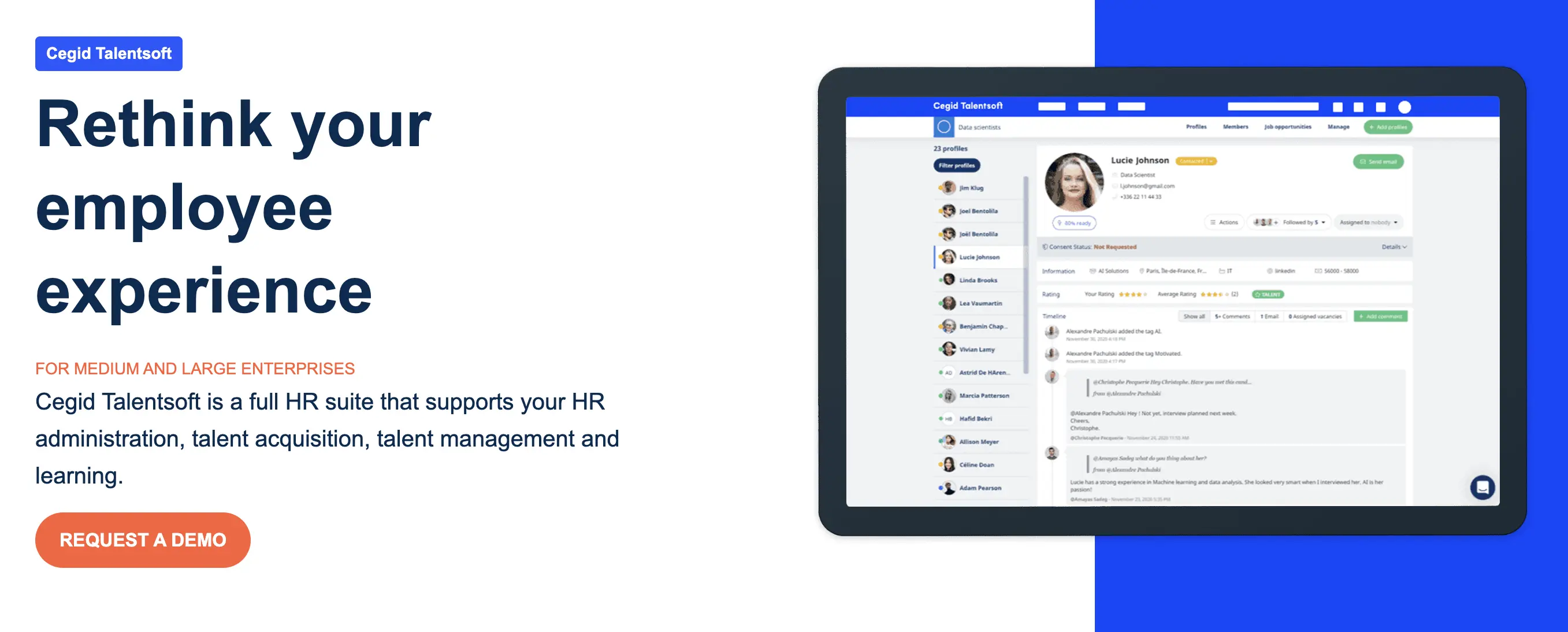
19. Personio
For: core HR tasks and payroll
Personio is a comprehensive HR management tool that covers everything from applicant tracking to payroll and performance reviews. It’s ideal for small to medium-sized enterprises (SMEs) looking for an end-to-end HR solution. The platform integrates with numerous third-party tools, making it easy to connect HR processes across the organization.
Why it’s powerful:
- HR and payroll automation: Personio ensures payroll accuracy and reduces manual entry.
- Integrated time tracking: The HR tool tracks employee hours and leave for streamlined payroll.
- Document storage: Users can centralize employee documentation for easy access and compliance.
Pricing: Depends on the number of employees at your company and whether you choose to add any extra features to your package.
20. Leena
For: chatbot support
One of the best AI tools for HR, Leena auto-resolves HR queries and acts like a virtual AI assistant. The tool streamlines ticket creation and resolution by adopting LLMs specifically trained on a wealth of HR and employee onboarding data. It can provide employees instant access to company policies and procedures, answers to benefits questions, payroll information and more.
Why it’s powerful:
- HR help desk: Leena can automate every aspect of the hire-to-retire journey of an employee and save time for higher-order activities.
- Contextual support: By working seamlessly with external models, the tool delivers error-free responses in line with organizational policies.
- Zero learning curve: You can use the AI assistant without an additional learning effort as it blends with existing channels like Slack and Microsoft Teams.
Pricing: Custom pricing; tailored by company size and integrations.
How to Use AI in HR: Best Practices & Tips
We’ve listed 20 powerful AI tools for HR, but implementing them effectively into your workflow is just as crucial. Here are key tips for maximizing the impact of artificial intelligence in human resources:
Maintain the Human Element
AI-driven intelligence can enhance efficiency and insights, but it can’t replace the human side of HR. Always ensure a personal touch remains, especially for sensitive matters like performance reviews and termination decisions.
Choose Transparent AI Tools
Select tools that offer clear explanations for their recommendations. Transparency builds trust in AI-driven HR processes, helping employees understand how AI impacts their careers and well-being.
Upskill Your HR Team
Integrating AI requires training in data literacy and AI fundamentals. Focus on helping HR colleagues interpret AI results, recognize potential biases, and understand the tool’s limitations.

Communicate AI’s Role to Employees
Make sure employees know how AI is used in HR and how it benefits them while prioritizing their wellbeing. Explain what data is collected and its role in decision-making.
Monitor Effectiveness Continuously
Don’t assume AI tools will work flawlessly out of the box. Regularly review whether they’re truly automating routine HR tasks, boosting employee engagement, and helping with continuous performance management.
By following these steps, you’ll integrate AI-powered platforms into HR in a way that’s efficient, transparent, and supportive of both organizational and employee goals.
Conclusion
From automating resume screening to streamlining onboarding and performance reviews, AI is reshaping HR operations today. By adopting AI thoughtfully, companies can make smarter decisions, reduce bias, and ensure that every stage of the employee lifecycle is handled with greater efficiency and care.
At the same time, these tools provide HR teams with actionable insights that go beyond efficiency, helping managers better understand employee performance and identify opportunities for professional growth. When implemented responsibly, AI enhances (not replaces) the human side of HR, enabling organizations to foster cultures where both businesses and employees thrive.
Frequently Asked Questions
Which HR tasks can AI automate?
AI can automate repetitive HR tasks such as resume screening, interview scheduling, payroll processing, and onboarding workflows. These automations save significant time while reducing the risk of human error, allowing HR professionals to focus on more strategic responsibilities.
Do HR AI tools require technical expertise to use?
Most AI tools for HR are designed with user-friendly dashboards and intuitive workflows, so they don't require deep technical expertise to use. With basic familiarity, HR professionals can leverage these tools to streamline processes and gain actionable insights.
How can generative AI be used in HR?
Generative AI can be used in HR to draft job descriptions, create training materials, and analyze employee feedback. It also supports HR communications by generating clear, consistent messages for onboarding, policy updates, and employee engagement initiatives.
How can ChatGPT help HR professionals?
With natural language processing capabilities, ChatGPT can help HR professionals answer common employee queries, draft surveys, and streamline candidate outreach. It can also be used to generate clear and inclusive job descriptions, policy documents, and training materials in seconds.
Can AI replace HR?
AI cannot entirely replace HR because human judgment, empathy, and relationship-building are central to people management. Instead, AI will increasingly continue to support HR by automating repetitive tasks, providing data-driven insights, and enabling professionals to focus more on strategic initiatives.
What risks come with using AI in HR?
One of the main risks of using AI in HR is ensuring data integrity, since inaccurate or biased inputs can lead to flawed decisions. Organizations must also handle employee data responsibly to protect privacy and maintain trust in AI-driven processes.
What is the future of AI in human resources?
In the near future, AI will improve decisions by using data to spot skills, predict attrition risks, and personalize learning while keeping clear audit trails for fairness and compliance. Success will depend on good data hygiene, transparent policies, and training HR staff to use AI responsibly alongside human judgment.

